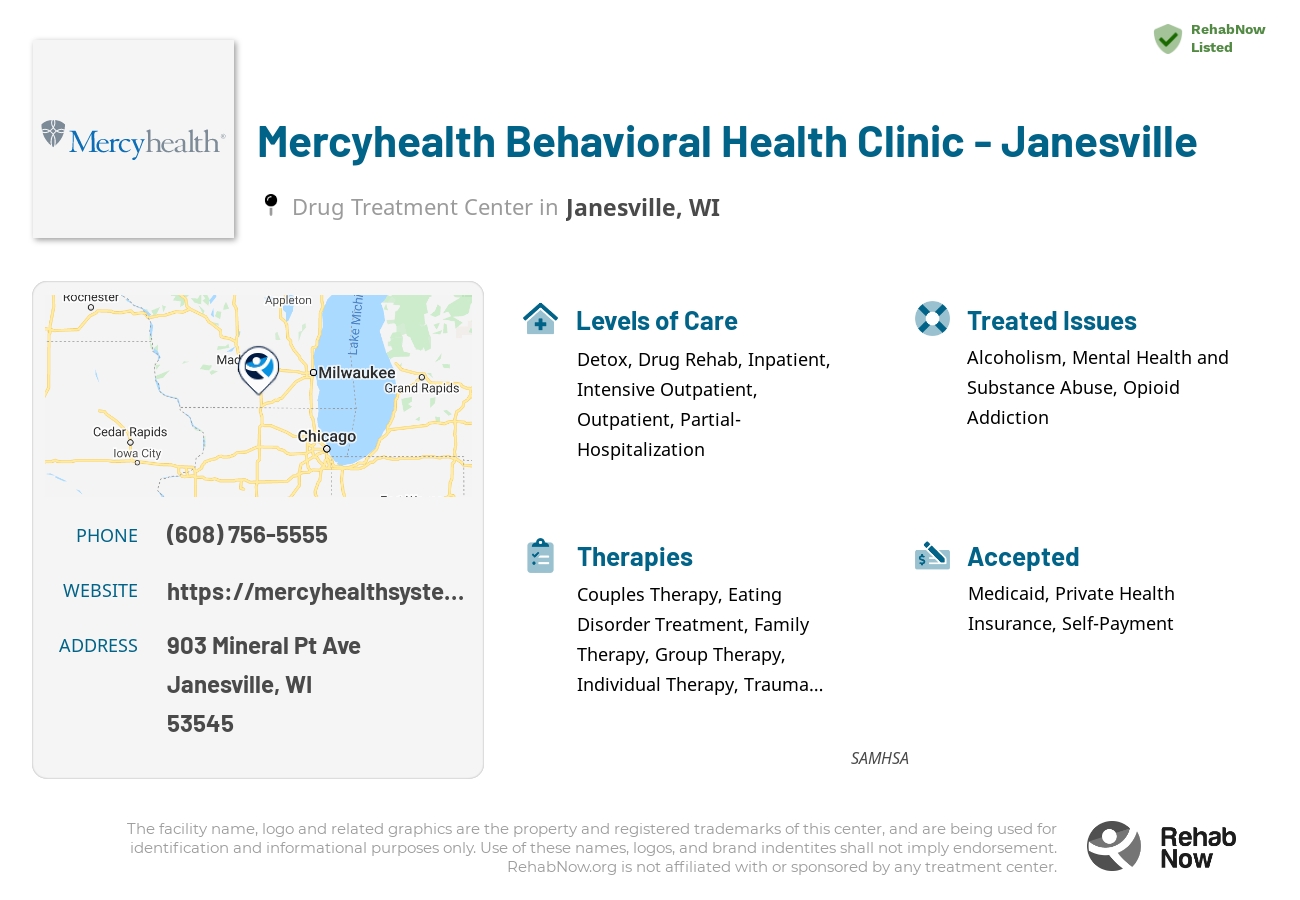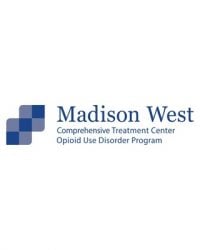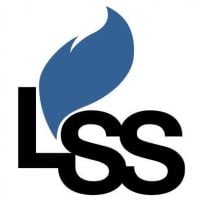Mercyhealth Behavioral Health Clinic - Janesville
Drug Rehab Center in Janesville, Wisconsin
Mercyhealth Behavioral Health Clinic - Janesville provides specialized mental health services to those suffering from addiction, offering a range of treatment options and evidence-based therapeutic approaches in a SAMHSA-accredited clinic that accepts private insurance.
About This Wisconsin Facility
Mercyhealth Behavioral Health Clinic - Janesville, located in Janesville, Wisconsin, is an accredited treatment facility specializing in the treatment of alcoholism, opioid addiction, dual diagnosis, eating disorders, and drug addiction. The clinic is certified by SAMHSA (Substance Abuse and Mental Health Services Administration), ensuring high-quality and evidence-based care for individuals seeking help with their substance abuse issues. Mercyhealth Behavioral Health Clinic offers a comprehensive range of treatment programs tailored to meet the specific needs of each patient, including detoxification, inpatient rehabilitation, intensive outpatient programs, outpatient counseling, and partial-hospitalization. The facility accepts private health insurance and is affiliated with Mercyhealth Behavioral Health Clinic, which further enhances their credibility and commitment to providing top-notch care to individuals struggling with addiction.
Mercyhealth Behavioral Health Clinic - Janesville provides a wide range of services to support individuals struggling with addiction and substance abuse. These services include detoxification, providing a safe and supervised environment for patients to rid their bodies of harmful substances. The clinic also offers drug rehab programs, in which individuals can receive intensive and structured treatment to address the root causes of their addiction. For those who require a more flexible treatment approach, Mercyhealth Behavioral Health Clinic offers outpatient and intensive outpatient programs, allowing patients to receive therapy and support while still maintaining their daily routines. Additionally, the clinic offers partial-hospitalization programs, providing a comprehensive and supportive treatment environment for individuals with more severe addiction or co-occurring mental health disorders. These various levels of care ensure that individuals can receive the appropriate treatment and support they need to overcome their addiction and achieve lasting recovery.
Genders
Ages
Modality
Additional
Accreditations
SAMHSA
Conditions and Issues Treated
Many people who struggle with opioid addiction need to attend specific programs like methadone , Suboxone or Vivitrol clinics.
These types of programs will provide the patient with legal, prescription medications that can help them overcome their cravings for illegal opioids like heroin or fentanyl . If the patient has a chronic condition like Hepatitis C, they must undergo treatment before they can begin taking these medications.
Levels of Care Offered at Mercyhealth Behavioral Health Clinic - Janesville
This center offers a variety of custom treatment tailored to individual recovery. Currently available are Detox, Drug Rehab, Inpatient, Intensive Outpatient, Outpatient, Partial-Hospitalization, with additional therapies available as listed below.
An addict may have to go through alcohol or drug withdrawal. While detox may be uncomfortable, it is not life-threatening. Detoxification allows the addict to rid the body of all traces of drugs or alcohol and gives the addict a clean slate for their recovery. In an inpatient or outpatient setting, detox can be managed medically.
Individuals who are suffering from severe addiction or have a high risk for dangerous health concerns are often recommended to receive inpatient treatment.
Choosing to enter an inpatient treatment program is beneficial for people who are suffering from severe addiction, or who have a high risk for dangerous health concerns.
Inpatient treatment is beneficial for:
- People who have a history of severe withdrawal.
- People who have attempted to overcome addiction on their own without success.
- People who have a history of relapse, or have recently relapsed.
- People at risk for drug overdose or withdrawal-related complications.
- People with medical conditions that are worsened by drug or alcohol use.
Outpatient addiction treatment is beneficial for people who are able to function well in their day-to-day lives. It is recommended for people who are not yet ready to end their relationships with friends or family members who might be encouraging drug and alcohol use.
Intensive outpatient treatment is beneficial for:
- People who are able to attend treatment more than 3 times per week.
- People who do not meet the criteria for inpatient treatment.
- People who are able to contribute to their own recovery outside of the treatment center.
- People who are motivated towards recovery.
- People who are able to overcome addiction on their own without the need for higher levels of care.
Outpatient treatment programs provide drug and alcohol addiction treatment through individual sessions with a counselor, group therapy, 12-step meetings, and other activities to help individuals gain sober living skills. Most programs are designed for those individuals who have completed a medically supervised detoxification program and provide opportunities for clients to begin the process of early recovery.
Outpatient programs also offer a level of medical support as needed and psychological backing through therapy. Clients are encouraged to live at home, though there may be some flexibility regarding this requirement based on the circumstances and needs of each patient.
Outpatient treatment is perhaps the most common type of dual diagnosis program available. It does not pose a significant financial burden on patients. However, it is essential to note that outpatient treatment does not provide the support and supervision given in residential programs. Some addicts may need this level of support to maintain their sobriety.
Partial Hospitalization Program, or PHP, is a type of drug addiction rehabilitation in the patient’s home. Patients often have to come into Mercyhealth Behavioral Health Clinic - Janesville for treatment on weekday evenings and weekends. They must also attend an intensive outpatient program at least 9 hours per week while attending PHP. The patient will meet with a counselor or therapist to help them work through their addiction issues. This type of treatment is used for patients who can go out among society but are at risk of relapsing due to continued exposure to drugs or alcohol.
Therapies & Programs
Therapy sessions focused on the individual addict can provide much-needed guidance as they work toward overcoming their addiction. These types of sessions typically involve guidance from a therapist, who will help addicts identify and process their feelings and cravings.
During these sessions, addicts may develop plans for coping with the triggers that typically lead to relapse and learn how to avoid those triggers during their recovery process.
If you are looking for drug recovery, couples therapy can be a great option. This type of therapy can help rebuild trust and joy in relationships that may have been damaged by addiction. It can also help reduce the dysfunctional behavior in a relationship that may trigger addiction. A patient’s partner will be involved in the process. They can also benefit from therapy, especially if they are trying to live with an addict.
The main goal of family therapy for drug addiction is to create an environment where communication can occur without judgment, hostility, or blame that often occurs within a family.
Family therapy is a type of group problem-solving that aims to improve communication and relationships between the patient, their family, and sometimes friends. The therapist is with the family as they learn to communicate with each other differently, especially with the addict when s/he is using.
The family can learn to reduce their enabling behavior or rally together and support each other during tough times. The patient also learns how to deal with their addiction and maintain sobriety while interacting with the family.
Different types of addiction treatment services are available. Within this article, group therapy is of interest due to its high success rate compared to individual therapy. Group therapy settings are beneficial because they allow recovering addicts to build a strong support network.
Benefits of group therapy are:
- Reduces feelings of isolation
- Immediate access to social support in the form of fellow addicts in recovery
- Lowers risk of relapse
- Increases rate of sobriety
- Builds coping skills that can be applied to everyday life
Trauma Therapy is a form of therapy that involves working with a patient to help them process and understand the past trauma(s) in their life. The idea behind it is that while some people can experience traumatic events and not have lasting psychiatric symptoms, many others will. In these cases, memories of the event get hidden from consciousness but continue to influence how the person processes and copes with things in their life. They may avoid situations that resemble what happened or become suddenly angry or irritated to a situation that reminds them of a past event.
With the help of a therapist, people can go back over memories and experiences. This helps them understand why they are having problems coping with certain situations and how they can change how they think and react to things. This therapy is typically done using techniques such as visualization, discussion, and writing down thoughts and feelings.
Trauma therapists will work with clients to help them understand their past and present relationships. Many times, patients may believe that something is inherently wrong with them or that they are unworthy of love. A therapist aims to correct these negative feelings and behaviors by helping the person realize that their actions do not reflect who they truly are.
One of the main goals of trauma therapy is to help clients express their emotions and talk about what they are feeling. This benefits both to increase awareness of how certain events have impacted them in the past and enables patients to realize that they can make changes in their lives.
Cognitive Behavioral Therapy (CBT) is used by drug treatment centers to help addicts comprehend the causes of their substance abuse and the consequences that follow. Through CBT, clients learn to recognize and avoid high-risk situations and cope with challenging situations when they arise.
CBT treatment often includes a combination of individual therapy, group therapy, lectures, and other activities. The treatment’s goal is to help addicts gain self-control and maintain abstinence from drugs and alcohol over the long term so that an addict can get sober and lead a more productive life.
CBT is particularly effective in helping people overcome their drug problems, especially people whose drug abuse is motivated by self-defeating beliefs and emotions.
Payment Options Accepted
For specific insurance or payment methods please contact us.
Is your insurance accepted?
Ask an expert, call (888) 674-0062
Mercyhealth Behavioral Health Clinic Associated Centers
Discover treatment facilities under the same provider.
- Mercy Health - Mineral Point View in Janesville, WI
- Mercy Options - Behavioral Health in Delavan, WI
- Mercyhealth Behavioral Health Clinic - Beloit in Beloit, WI
Learn More About Mercyhealth Behavioral Health Clinic Centers
Additional Details
Specifics, location, and helpful extra information.
Janesville, Wisconsin 53545 Phone Number(608) 756-5555 Meta DetailsUpdated November 25, 2023
Staff Verified
Patient Reviews
There are no reviews yet. Be the first one to write one.
Janesville, Wisconsin Addiction Information
Wisconsin has some of the highest rates in the United States for both adolescent and adult substance abuse. Since 2009, the state has been experiencing the same escalating rates of drug abuse and addiction as the rest of the country. The major concerns are the misuse of prescription painkillers and the escalating number of deaths due to alcohol-related liver disease.
According to the Substance Abuse and Mental Health Services Administration in Janesville, Wisconsin approximately 15% of the population struggle with addiction of some kind. Many different drugs are abused, including marijuana, methamphetamine, ecstasy, cocaine, heroin, painkillers like oxycodone (OxyContin), and sedatives like benzodiazepines (Xanax). There are a variety of drug treatment options available in Janesville, Wisconsin. Some of the most common include inpatient and outpatient treatment and detoxification services.
Treatment in Nearby Cities
- Phillips, WI (219.0 mi.)
- Wautoma, WI (96.9 mi.)
- New Holstein, WI (99.5 mi.)
- Mayville, WI (61.0 mi.)
- Superior, WI (317.3 mi.)
Centers near Mercyhealth Behavioral Health Clinic - Janesville
The facility name, logo and brand are the property and registered trademarks of Mercyhealth Behavioral Health Clinic - Janesville, and are being used for identification and informational purposes only. Use of these names, logos and brands shall not imply endorsement. RehabNow.org is not affiliated with or sponsored by Mercyhealth Behavioral Health Clinic - Janesville.







